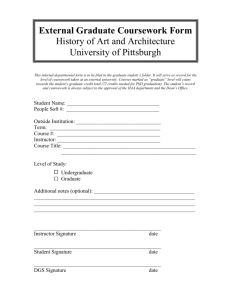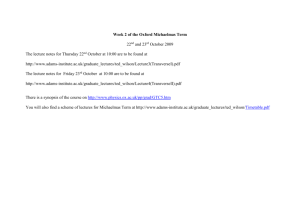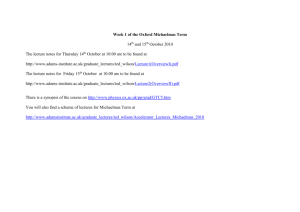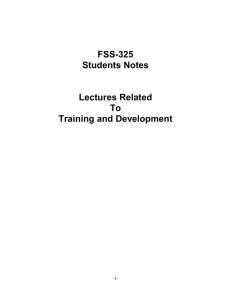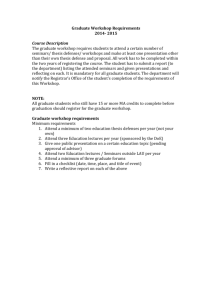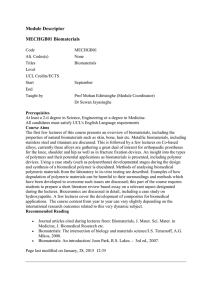Remote Sensing of Concrete Structures - UL
advertisement
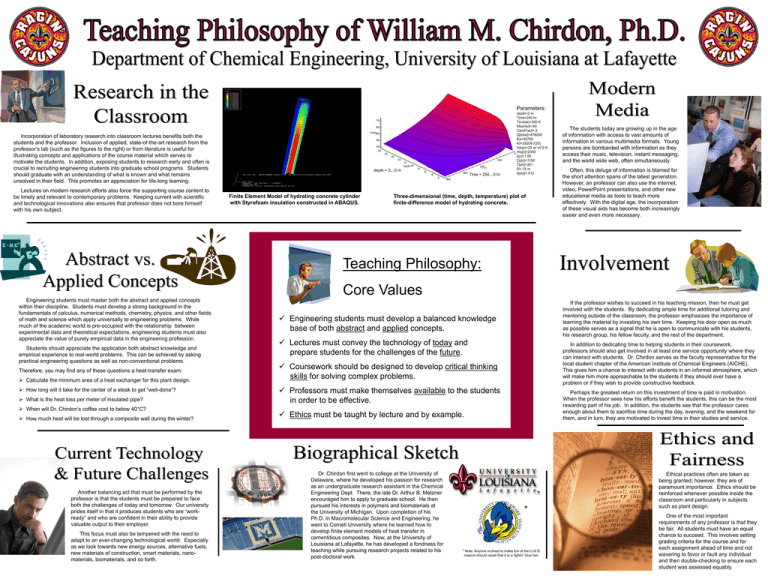
Parameters: Incorporation of laboratory research into classroom lectures benefits both the students and the professor. Inclusion of applied, state-of-the-art research from the professor’s lab (such as the figures to the right) or from literature is useful for illustrating concepts and applications of the course material which serves to motivate the students. In addition, exposing students to research early and often is crucial to recruiting engineering students into graduate school programs. Students should graduate with an understanding of what is known and what remains unsolved in their field. This promotes an appreciation for life-long learning. Lectures on modern research efforts also force the supporting course content to be timely and relevant to contemporary problems. Keeping current with scientific and technological innovations also ensures that professor does not bore himself with his own subject. depth = 2…0 m Finite Element Model of hydrating concrete cylinder with Styrofoam insulation constructed in ABAQUS. Time = 250…0 hr depth=2 m Time=250 hr T(initial)=300 K MaxHyd=.60 CemFract=.2 Q[total]=478000 Ea=45700 k0=29209./(20) h(top)=25 w/ m^2 K rho[c]=2350 k[c]=1.65 Cp[c]=1150 T[air]=301 D=.15 m k[sty]=.012 Three-dimensional (time, depth, temperature) plot of finite-difference model of hydrating concrete. The students today are growing up in the age of information with access to vast amounts of information in various multimedia formats. Young persons are bombarded with information as they access their music, television, instant messaging, and the world wide web, often simultaneously. Often, this deluge of information is blamed for the short attention spans of the latest generation. However, an professor can also use the internet, video, PowerPoint presentations, and other new educational media as tools to teach more effectively. With the digital age, the incorporation of these visual aids has become both increasingly easier and even more necessary. Teaching Philosophy: Core Values Engineering students must master both the abstract and applied concepts within their discipline. Students must develop a strong background in the fundamentals of calculus, numerical methods, chemistry, physics, and other fields of math and science which apply universally to engineering problems. While much of the academic world is pre-occupied with the relationship between experimental data and theoretical expectations, engineering students must also appreciate the value of purely empirical data in the engineering profession. Students should appreciate the application both abstract knowledge and empirical experience to real-world problems. This can be achieved by asking practical engineering questions as well as non-conventional problems. Therefore, you may find any of these questions a heat-transfer exam: Calculate the minimum area of a heat exchanger for this plant design. How long will it take for the center of a steak to get “well-done”? What is the heat loss per meter of insulated pipe? When will Dr. Chirdon’s coffee cool to below 40°C? How much heat will be lost through a composite wall during the winter? Another balancing act that must be performed by the professor is that the students must be prepared to face both the challenges of today and tomorrow. Our university prides itself in that it produces students who are “workready” and who are confident in their ability to provide valuable output to their employer. This focus must also be tempered with the need to adapt to an ever-changing technological world. Especially as we look towards new energy sources, alternative fuels, new materials of construction, smart materials, nanomaterials, biomaterials, and so forth. If the professor wishes to succeed in his teaching mission, then he must get involved with the students. By dedicating ample time for additional tutoring and mentoring outside of the classroom, the professor emphasizes the importance of learning the material by investing his own time. Keeping his door open as much as possible serves as a signal that he is open to communicate with his students, his research group, his fellow faculty, and the rest of the department. Engineering students must develop a balanced knowledge base of both abstract and applied concepts. Lectures must convey the technology of today and prepare students for the challenges of the future. In addition to dedicating time to helping students in their coursework, professors should also get involved in at least one service opportunity where they can interact with students. Dr. Chirdon serves as the faculty representative for the local student chapter of the American Institute of Chemical Engineers (AICHE). This gives him a chance to interact with students in an informal atmosphere, which will make him more approachable to the students if they should ever have a problem or if they wish to provide constructive feedback. Coursework should be designed to develop critical thinking skills for solving complex problems. Professors must make themselves available to the students in order to be effective. Perhaps the greatest return on this investment of time is paid in motivation. When the professor sees how his efforts benefit the students, this can be the most rewarding part of his job. In addition, the students see that the professor cares enough about them to sacrifice time during the day, evening, and the weekend for them, and in turn, they are motivated to invest time in their studies and service. Ethics must be taught by lecture and by example. Dr. Chirdon first went to college at the University of Delaware, where he developed his passion for research as an undergraduate research assistant in the Chemical Engineering Dept. There, the late Dr. Arthur B. Metzner encouraged him to apply to graduate school. He then pursued his interests in polymers and biomaterials at the University of Michigan. Upon completion of his Ph.D. in Macromolecular Science and Engineering, he went to Cornell University where he learned how to develop finite element models of heat transfer in cementitious composites. Now, at the University of Louisiana at Lafayette, he has developed a fondness for teaching while pursuing research projects related to his post-doctoral work. * * Note: Anyone inclined to make fun of the U of D mascot should recall that it is a fightin’ blue hen Ethical practices often are taken as being granted; however, they are of paramount importance. Ethics should be reinforced whenever possible inside the classroom and particularly in subjects such as plant design. One of the most important requirements of any professor is that they be fair. All students must have an equal chance to succeed. This involves setting grading criteria for the course and for each assignment ahead of time and not wavering to favor or fault any individual and then double-checking to ensure each student was assessed equably.

